再论《爱玛》中爱玛的自我认识马蓉
2024年爱玛读后感大学

2024年爱玛读后感大学____年,《爱玛》一书震撼出版,就在我读完这本经典之作后,我被它所带给我的思考所深深吸引。
尽管时间已经跨越了五年之久,但这本书的魅力和智慧依然感染着我。
爱玛这个角色以及她的故事带给我了许多启示,让我深入思考了人性、自我意识和情感世界等诸多关键问题。
以下是我对于《爱玛》的一些读后感。
首先,我对书中主人公爱玛有着深深的敬意。
爱玛这个角色虽然有着千疮百孔的人性弱点,但她依然展现出了强大的自我意识和独立思考的能力。
她拥有出色的智慧和敏锐的洞察力,能够准确地观察和判断周围的人和事。
她也有着强烈的情感和热情,对自己喜欢的人和事情全身心地投入其中。
尽管她的行为有时显得冲动和自私,但她从不掩饰自己的真实情感和思想。
她是一个真实而复杂的人物,她的魅力正是因为她的人性弱点和坚持不懈的追求。
其次,这本书还给我带来了对于人性的反思。
在爱玛这个角色身上,我们可以看到人性的复杂和多样性。
她的冲动、自私和错误判断等行为让人不禁怀疑人性的善恶。
然而,在她遭受挫折和痛苦之后,她逐渐成熟起来,开始认识到自己的错误,并努力纠正。
这种成长过程使她更加接近真实的人性,展示了人性中的善良、慈悲和智慧。
通过爱玛的故事,这本书告诉我们,人性不是一成不变的,而是在不断成长和改变中。
此外,我对书中的情感世界也深感震撼。
爱玛这个故事以爱情为主线,展现了人们内心深处的情感世界。
无论是爱玛还是其他角色,他们的内心都充斥着各种情感,包括爱、恨、嫉妒、欲望等。
爱情在这个故事中不仅是一个简单的感情纽带,它承载着人们对于自由和幸福的追求。
爱玛对于她的爱人弗兰克·钱奇的感情,正如书中描述的那样,“她爱他,她渴望着他的声音,他的情感”。
这种深深的情感渴望让我感到震撼,也让我开始思考什么是真正的爱情。
在这本书中,我不仅体会到了爱玛这个角色的魅力,还对作者简·奥斯汀的智慧和洞察力深感钦佩。
通过对于这个小小社交圈的描绘,简·奥斯汀展现了人性的复杂和社会的阶级分化。
An Analysis of Feminism in Emma
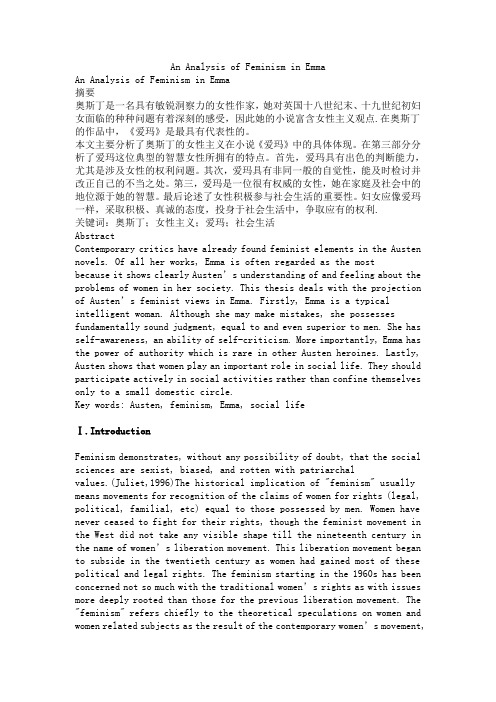
An Analysis of Feminism in EmmaAn Analysis of Feminism in Emma摘要奥斯丁是一名具有敏锐洞察力的女性作家,她对英国十八世纪末、十九世纪初妇女面临的种种问题有着深刻的感受,因此她的小说富含女性主义观点.在奥斯丁的作品中,《爱玛》是最具有代表性的。
本文主要分析了奥斯丁的女性主义在小说《爱玛》中的具体体现。
在第三部分分析了爱玛这位典型的智慧女性所拥有的特点。
首先,爱玛具有出色的判断能力,尤其是涉及女性的权利问题。
其次,爱玛具有非同一般的自觉性,能及时检讨并改正自己的不当之处。
第三,爱玛是一位很有权威的女性,她在家庭及社会中的地位源于她的智慧。
最后论述了女性积极参与社会生活的重要性。
妇女应像爱玛一样,采取积极、真诚的态度,投身于社会生活中,争取应有的权利.关键词:奥斯丁;女性主义;爱玛;社会生活AbstractContemporary critics have already found feminist elements in the Austen novels. Of all her works, Emma is often regarded as the mostbecause it shows clearly Austen’s understanding of and feeling about the problems of women in her society. This thesis deals with the projection of Austen’s feminist views in Emma. Firstly, Emma is a typical intelligent woman. Although she may make mistakes, she possesses fundamentally sound judgment, equal to and even superior to men. She has self-awareness, an ability of self-criticism. More importantly, Emma has the power of authority which is rare in other Austen heroines. Lastly, Austen shows that women play an important role in social life. They should participate actively in social activities rather than confine themselves only to a small domestic circle.Key words: Austen, feminism, Emma, social lifeⅠ.IntroductionFeminism demonstrates, without any possibility of doubt, that the social sciences are sexist, biased, and rotten with patriarchalvalues.(Juliet,1996)The historical implication of "feminism" usually means movements for recognition of the claims of women for rights (legal, political, familial, etc) equal to those possessed by men. Women have never ceased to fight for their rights, though the feminist movement in the West did not take any visible shape till the nineteenth century in the name of women’s liberation movement. This liberation movement began to subside in the twentieth century as women had gained most of these political and legal rights. The feminism starting in the 1960s has been concerned not so much with the traditional women’s rights as with issues more deeply rooted than those for the previous liberation movement. The "feminism" refers chiefly to the theoretical speculations on women and women related subjects as the result of the contemporary women’s movement,which is markedly different from the previous feminism.Although we find problems with research exclusively “on women”, we see an emphasis on research by women as absolutely fundamental to feminist research. We reject the idea that men can be feminists because we argue that what is essential to ‘being femi nist’ is the possession of feminist consciousness.(Wallace,1995) And we see feminist consciousness as rooted in the concrete, practical and everyday experiences of being, and being treated as, a woman. Feminine consciousness is a particular kind of interpretation of the experience of being a woman as this is presently constructed in sexist society. No men know what it is to be treated as a woman; and even fewer interpret such treatment in the ways we shall define as central to ‘feminist consciousness’.Most non-feminist ‘scientific’ explanations of the unequal status of women in society are written in terms of ‘grand theory’, and are particularly good examples of this approach. ‘Grand theories’ provide us with abstract, universal explanations, each of which suggests one single ‘cause’ for the inequality of all women in all places and at all times. The most central and common belief shared by all feminists, whatever our ‘type’, is the presupposition that women are oppressed. It is from this common acceptance that there is indeed a problem, which there is something amiss in the treatment of women in society that feminism arises.This statement of women’s oppression is a factual one for feminists and is not open to debate. All feminists accept that women are oppressed on the basis of their own experiences and those shared with other women. Also all feminists agree that women’s oppression is not inevitable, but that it can and must be changed. (Christopher Gillie,1985) We concern the new understanding that women gain through consciousness-raising activities. This involves seeing the same reality differently. To express this another way, women’s understandings of our lives are transformed so that we see, understand and feel them in a new and quite different way, at the same time as we see them in the ‘old’ way. This ‘new way’ of seeing the same reality, whilst also seeing a new reality, involves a situation in which women come to understand the contradictions present within life. Reality is much more complex and multi-dimensional than we ordinarily suppose it to be, and it is contradictory.Ⅱ. Feminism in the Eighteenth CenturyThe current phase of feminism is usually seen as originating in the 1960s. Yet, the 1960s were not the beginning of history of women’s struggle. Probably since the beginning of cultural organization, many women have been acutely conscious of the inequality of their position and of the male misrepresentation by which the inequality is maintained.In the eighteenth century there was a feminist tradition in English Novel, although not very distinguished. English fiction in the eighteenth achieved, among other things, an enlargement of the scope of moral discourse, allowing new topics to be considered in new ways. Among the new topics, the moral nature and status of women was one of the most important.Eighteenth-century feminism was not in general specifically concerned with the political equality of women, though it is true that, from the start, it carried political implications, first brought out into the open by Catherine Macaulay and Mary Wollstonecraft in the early 1790s.The feminist impulse showed itself first in its objection to the assignment of women to an inferior status as spiritual and moral beings. The first well-articulated female claim to equality was not directed towards enfranchisement via the ballot box, but to delivery of women from the restrictions which it had pleased male theologians, moral philosophers and poets to impose upon women.( Kirkham,1997)The essential claim of feminism during this period (Enlightenment feminism) was that women, not having been denied powers of reason, must have the moral status appropriates to “rational beings”, formed in the image of a rational God. Feminist moralists were in general confident that an improvement in the status of women would be brought about through increasing their powers of rational understanding and reflection. The demand for an adequate education, the main practical concern of Enlightenment feminism, arose directly from this.Enlightenment feminism in the eighteenth century, with its emphasis on Reason and its preoccupation with the middle class, may not strike contemporary feminists as not having much to do with liberation, but this is a misunderstanding. The most orthodox beliefs, when applied to a class of persons previously excluded from serious moral and political discourse, may take on a new aspect.Jane Austen’s novels are the culmination of a line of development in thought and fiction which goes back to the start of the eighteenth century, and which deserves to be called feminist since it was concerned with establishing the moral equality of men and women and the proper status of individual women as accountable beings. ( Kirkham,1997)In this sense, Austen is progressive compared with most female novelists of her day, such as Fanny Burney, Charlotte Smith, Maria Edgeworth and Anne Radcliffe. Jane Austen ridicules the sentimental and romantic conventions in their fictions. Meantime, Austen differs from them in her rejection of contemporary and traditional conceptions of the heroine or the lady. The woman who is “innocent as an angel and artless as purity itself”(Bradbrook,1967) is satirized by Austen.In subverting the ideal female image, Jane Austen can be ranked with the famous feminist Mary Wollstonecraft, although Austen is never so radicalas Wollstonecraft to demand a complete reorganization of the society. Ⅲ.The Embodiment of Feminism in EmmaModem reviewers consider Emma as Austen’s masterpiece, especially because the novel shows clearly Jane Austen’s understanding of and feeling about the problems of women in her society. Claudia Johnson, a contemporary scholar, thought: “In its willingness to explore positive versions of female power, Emma itself is an experimental production of authorial independence unlike any of Austen’s othernovels."( Johnson,1988)A. Emma is a Woman who has Sound JudgmentTraditionally it was held that women were not endowed with powers of mind by nature and they were deprived of the inherent right to think and judge. Thus, any mental exercises were dangerous to women. Wendy Martin noted: “A thinking woman was considered such a breach of nature that a Harvard Doctor reported during his autopsy on a Radcliffe graduatehe discovered that her uterus had shriveled to the size of apea.”(Gilbert,1979) Even if this claim does not directl y advocate that imbecility in females is a great enhancement of their personal charms, it does tell us that feminine capacity is not for thinking, judging and reasoning. John Ruskin affirmed even in 1865 that the woman’s intellect, if she did have, was onl y for “sweet orderings of domesticity.” (Gilbert,1979)Female capability consisted in emotion. Therefore, it was a woman’s first duty in life to cultivate her feminine talents in the emotional realm so as to maximum their usefulness within the domestic orbit. Any woman who indulged her personal ambitions or a selfish desire for intellectual independence or economic independence was betraying what conduct books called her “womanhede’’ (Rowbotham,1989) Jane Austen never agreed with the idea that women were intellectual inferiors to men. Her belief in sound female intelligence leads her to create young women as rational beings rather than elegant ladies without mind. Emma is such a he mine, assertive, intelligent, powerful, and self-conf dent. Since Emma’s conduct is “directed chiefly by her own judgment”, her superior intellectual ability is in the first place characterized by her own judgment. Although Emma frequently makes mistakes, Jane Austen demonstrates that her judgment is basically sound and convincing.Emma’s good judgment is mainly reflected by her argument with Mr. Knightley, a sensible gentleman who has long been acting as Emma’s teacher as well as her brother. He quarrels with Emma because the latter has induced Harriet Smith to refuse Robert Martins proposal. This quarrelover Harriets marriage indeed does not display Emma’s ill-judgment, but Mr. Knightleys irrationality The arguments of both parties are more concerned with certain contemporary ideas about intellectual power, marriage and status than with Harriet Smith and Robert Martin themselves. In other words, they argue for their own sake, or from the point of view of different sexes respectively.When Mr. Knightley complacently tells Emma that Robert Martin “means to marry” Harriet, he takes it for granted that Harriet is very willing to accept the proposal. Here the expression “means to marry her” shows so evidently the male superiority Mr. Knightley does not seem to notice that he has totally ignored Harriets own wish and reduced her only to a silent object even without the right of saying “No”.Emma immediately finds it an old-fashioned stereotype of proposal, so she asks: “but is he sure that Harriet means to marry him? ”( Jane Austen,1994) which is theoretically and rationally a perfectly justifiable question. Emma tries to remind Mr. Knightley that any woman is entitled to make her own choice in marriage. However, Mr. Knightley regards Emma’s reaction as merely a fashionable, feminine pretense. Mr. Knightley praises Robert Martins good sense and talks about his own good intention. When he knows Harriet has refused Martins proposal, he is confused and angry. Now in Mr. Knightleys eyes “the fair lady”, Harriet, becomes “a greater simpleton”, “the foolish girl” and little better than a base-born idiot just because she rejects Martins proposal. Emma, by contrast, judges more rationally: “it is always incomprehensible to a man that a woman should ever refuse an offer of marriage. A man always imagines a woman to be ready for anybody who asks her.”(Jane Austen,1994) Emma s remarks imply, on the one hand, that women are traditionally cultivated to be obedient,modest, selfless so that they are regarded merely as ornaments not only without the ability ofself-assertion but also without the right of refusal. On the other hand, Emma alludes to the fact that men are so accustomed to women’s deference that they cannot think otherwise.Mr. Knightley cant retort Emma’s argument and has to dwell on Harriets humble birth and slow mind. He exclaims: “A degradation to illegitimacy and ignorance,to be married to a respectable, intelligent gentleman farmer!”( Jane Austen,1994) His unjust contempt of Harriet due to her birth indicates distinctly his conservative thought that Harriet, as an illegitimate girl of unknown parentage, is not up to the role of a decent farmers wife. But Emma makes a brave defense of Harriet:“As to the circumstances of her birth, though in a legal sense she may be called Nobody it will not hold in common sense. She is not to pay for the offence of others, by being held below the level of those with whom she is brought up.” ( Jane Austen,1994)Emma shows her sound judgment in her objection to the general injusticeof the laws and discriminative attitude of the society towards illegitimate children. Although most people are prejudiced against Harriet for her low birth, including impartial Mr.Knightley, Emma alone dare announce Harriet should not be looked down upon for the sin of her parents because it is not her fault.Emma insists that Harriet is equal to any one as a human being. At the same time, Emma indirectly condemns the irresponsibility of Harriets parents, especially the unknown father, a symbol of paternal immorality. When Mr. Knightley calls Harriet a “simpleton” and an “idiot”, he is n’t aware that he has again fallen into contradiction. Mr. Knightley apparently regards a woman’s possession of intellectual power as a disadvantage, a misfortune, or more accurately a sin, because themale-dominated society prefers to cultivate foolish girls who are supposed to listen to men and follow their leadership.Emma responds by giving a retort:“...till they do fall in love with well-informed minds instead of handsome faces, a girl, with such loveliness as Harriet, has a certainty of being admired and sought after, of having the power of choosing from among many, consequently a claim to be nice. ...1 am very much mistaken if your sex in general would not think such beauty, and such temper, the highest claims a woman could possess.” ( Jane Austen,1994)Here Emma evidently criticizes a social willingness to believe physical beauty and submissive temper more admirable than intellectual capabilities or good sense in women. What this paternal society asks a woman to be is an angel in the house rather than a. creature of ration. Mr. Knightley can hardly deny that Emma is right in her judgment.As the novel develops, Mr. Knightley changes his mind about Harriet after frequent contact with Harriet. Mr. Knightley later tells Emma: “And I am changed also; for I am now very willing to grant you all Harriets good qualities. ”( Jane Austen,1994) “Harriet Smith has some first-rate qualities, which Mrs. Elton is totally without.”( Jane Austen,1994)He acknowledges Emma’s sound power of judgment and superior intelligence by saying “Nature gave you understanding.” In Emma Austen changes the traditional mentor-student relationship between man and woman and tries to show us that an intelligent woman like Emma is capable of making sound judgment, and teaching a man what is right and what is wrong.B. Emma is a Perfect Self-awareness WomanAlthough Emma is a heroine with superior intellectual power, readers do not overlook her weaknesses such as vanity, self-importance and snobbery. However, for all her faults we cant help caring for her because Jane Austen has given her a positive and attractive quality that is self-awareness. Mr. Knightley has told Emma that he believes in Emma’s“serious spirit”.This “serious spirit” refers to the power to objectively analyze ones own words and deeds, carefully examine ones own behavior, judiciously assess ones own right and wrong, and bravely correct ones mistakes. Those who have sound self-awareness and can truly examinethemselves continually will eventually expand their spirit and achieve moral improvement. On the contrary, Austen showed repeatedly those clever people without self-awareness may lose the opportunities of correcting their wrong-doings and tend to end in not only regret and unhappiness, but permanent disgrace.Emma has been scolded for her interference with Harriet Smith, her insult to Miss Bates as well as her indifference to Jane Fairfax. These criticisms lead her to recognize her errors.When Emma knows it is her whom Mr. Elton means to pursue rather than her friend, Harriet, she is so shocked and ashamed that she "sat down to think". She "looked back as well as she could". She wishes that she "had not persuded Harriet into liking the man" ( Jane Austen,1994)It is the first time that Emma finds that she has made a mistake about Harriet and begins to examine her own conduct. When Harriet declares she has fallen in love with Mr. Knightley, Emma realizes bitterly it is not Harriets fault, but her own. "The blunders, the blindness of her own head and heart" "had brought evil on Harriet, on herself and on Mr. Knightley".( Jane Austen,1994)Such recognition implies a total examination of herself and an admission that her scheme to find Harriet a husband of high rank has been irrational, obscure and delusive. It also implies her rejection of subjective supposition in favor of objective and impartial reasoning.Emma’s flirtation with Frank is also a disgrace, although at that time she is still in the dark about Franks engagement with Jane Fairfax. Emma does not really care for Frank and only feels intoxicated with Franks flattery. She admits to herself that she is being false andbself-indulgent. conscience also tells her that she has long been scornful and ungracious to Miss Bates. She makes a resolve to begin a regular, equal, kindly intercourse by calling upon Miss Bates the very next morning after Box Hill outing.Although Emma frequently commits errors, she is aware of them. From time to time she reconsiders her behavior, criticizes herself and tries her best to make reparation. The liveliness of her conscience, the depth of her intelligence and the sincerity of her sympathy open a path to her moral improvement and better sense.Lionel Trilling points out that Emma’s mistakes themselves are what make her lovable, because all human being are fallible and even the best mind makes mistakes.( Gooneratne,1970)In Jane Austen’s worlds, all the heroines have to struggle with their own weakness and fallibility and make efforts to arrive at a better judgment of themselves. And this processis never-ending.Those who can accomplish this are women of truly prominent intellectual and moral power. Emma stands among the very few of them. As Mrs. Weston says: “Emma has qualities which may be trusted; she will never lead any one really wrong; she will make no lasting blunder; where Emma errs once, she is in the right a hundred times.” ( Jane Austen,1994)C. Emma is a Woman who has the Power of AuthorityIn Jane Austen’s age, it was universally accepted that authority is based on rationality. As women are supposed to be only emotional creatures, the notion that women have authority or power is naturally rejected. An author for the Edinburgh Review dismissed the proposition that men and women would ever be equal "in power and influence upon the affairs of the world" and even warned that if women are "made ostensibly powerful...the spirit of chivalry...will speedily cease".( Newton,1997) This claim partly justifies what Simone de Beauvoir has said: men tend to construct positive masculine identity through a negative feminine image. Thus, women’s lack of authority rightly reflects the powerfulness of men as well as their superiority.In consequence, it is understandable that few women have authority because social ideology requires relinquishment of female authority of any form. But Jane Austen is daring in her attempt to subvert the traditional idea by creating a heroine with the power of authority in Emma.Emma Woodhouse is physically strong, intellectually active and morally superior. She refuses to have her destiny determined by a man. In fact, what makes Emma unusual is the fact that Emma is a woman who asserts her own authority. In so doing, she undoubtedly offends this male-domonated society. Therefore, it is not surprising that Mudricks accusation that "Emma has no tenderness" really means that she is not submissive to men: hers is “a dominating and uncommitting personality".( Johnson,1988) In an age when obedience was the only duty of women, the idea was rooted that women were not qualified for possession of authority because of their inferior intellectual capability. It was even advocated that womens possession of talent is "the possession of a dangerous heritage---a jewel which cannot with propriety be worn". If one says women "preside" in the home, the word preside may produce a startling effect upon the ear of man, (Newton,1997)so warned a conduct-book writer.Yet, Emma is the real ruler of the household at Hartfield. Her father is poor in health all his life and his intellectual, physical and even moral frailty necessitates his dependence upon Emma’s female strength and good judgment. So Emma has been mistress of the house ever since she was twelve. She manages the household with skillful diplomacy.At the dinner table, Emma takes the duties of "patriarchal hospitality"upon her own shoulders. She allows her father to talk, but supplies food to the visitors in a grand style. When disputes are very likely to break out among her guests, Emma always subtly steers them away from uncomfortable topics.Emma’s excellent superintendence over Hartfield, a symbol of superior female and power, is in sharp contrast with Mr.Woodhouses disability. Austen seems to have subverted the convention that female is supposed to be inferior to male. Instead, Austen hints that the reign of a capable intelligent woman is preferable to that of a man.Besides her authority in her domestic circle, Emma is also the leader of her whole community People in the neighborhood acknowledge Emmas preeminence. When the Coles,who have accumulated fortune out of trade, intend to hold a dinner party for respectable people in Hibury, the one to whom they attach special importance is Miss Woodhouse. Emma is so sure of herself that she says: "I always deserve the best treatment, because I never put up with any other."( Jane Austen,1994)At the end of the novel, Emma eventually marries Mr. Knightley and marriage often means relinquishment of female power. Wayne Booth has declared, “Marriage to an intelligent, amiable, good, and attractive man is the best thing that can happen to this heroine…’’( Johnson,1988)With Mr. Knightleys decision of moving to Hartfield after marriage, the ending of Emma turns back on the conventions. Considering his own high status Mr. Knightleys move into Hartfield is extraordinary---“how very few of those men in a rank of life to address Emma would have renounced their own home for Hartfield! ”(Jane Austen,1994) By moving to Hartfield, Mr. Knightley is now sharing Emma’s home, and placing himself within her domain. The fact suggests that Mr. Knightley openly justifies Emma’s authority.D.Emma have a Positive Attitude toward Social LifeJane Austen points out that if women want to play an important mle in the society, they must first develop a positive attitude toward social activities. This attitude originates from an acute consciousness that a woman is not supposed only to be a good wife and a good mother, but she is also a a member of the society. Thus, she has the right and the responsibility to contribute to her society as a man has always done. Those women who are enthusiastic about social life and sincerely concerned with others welfare can achieve fulfillment.Emma Woodhouse is a good case in point. Energetic and intelligent as Emma is, she always has a positive attitude toward her role in social life, which leads her to take an active part in social activities. In addition to caring for her family members, Emma is always concerned about others happiness, especially women’s well-being. Emma’s patronage of Harriet is a good example. Austen explicitly shows Emma’s intimacy with Harrietis of great social significance, because women, as socially weaker members, ought to be united and help each other. Those women who merely care for their own happiness actually "transgressed the duty of womanby woman".(Jane Austen,1994)Though Mr. Knightley criticizes of Emma’s indifference to the Bates, Emma never withdraws her concern for them. She takes care to send a hindquarter of pork to them when Miss Bates meations that they havent any meat to eat. Having seen Janes poor condition, Emma, "on reaching home, called the housekeeper directly to an examination of her stores;and some arrow-root of very superior quality was speedily dispatched to Miss Bates with a most friendly note".(Jane Austen,1994)When Emma does all these, she does not attempt to show off or get a good reputation. Her concern is sincere. She adopts an active and proper attitude toward social life and other people.Compared with Emma, Mrs. Elton is selfish. Though she declares "I always stand up for women",(Jane Austen,1994) her eagerness to defend her sex derives definitely from her obvious desire to show her superiority over all others.Though different from Mrs Elton, Jane Fairfax holds a passive attitude because she has a real desire to live within herself. Emma finds that "Jane was, besides, which was the worst of all, so cold, so cautious! There was no getting at her real opinion. Wrapt up in a cloak of politeness, she seemed determined to hazard nothing. She was disgustingly, was suspiciously reserved".(Jane Austen,1994) Not only is Jane reserved, but she does not care for others at all. Her true interest in life never goes beyond the confines of her own well-being.ConclusionJane Austen’s fundamental feminist concerns may be seen from her constant insistence on women’s intellectual power. Her firm belief in women’s intelligence leads her undoubtedly to revise the conventional female image in popular novels of her day. She depicts her heroines as rational creatures. Emma Woodhouse is very likely the most brilliant one of them. As a young ardent woman with distinguished intellectual capability, Emma has sound judgment. Emma’s ardent defense of Harriets right to refuse Martins proposal is a good example. Emma explicitly protests against the popular idea of her day that women are generally regarded as objects without their own will or right. The image of Emma shows that have superb intelligence which is equal to, and sometimes even superior to mens. Moreover, Emma’s feminism are manifested by her firm belief that women should participate actively in social life rather than confine themselves only to a small domestic circle. If a woman is merely interested in or concerned about her own family, her life and influence are miserably。
简·奥斯汀《爱玛》中女性意识的觉醒与缺失
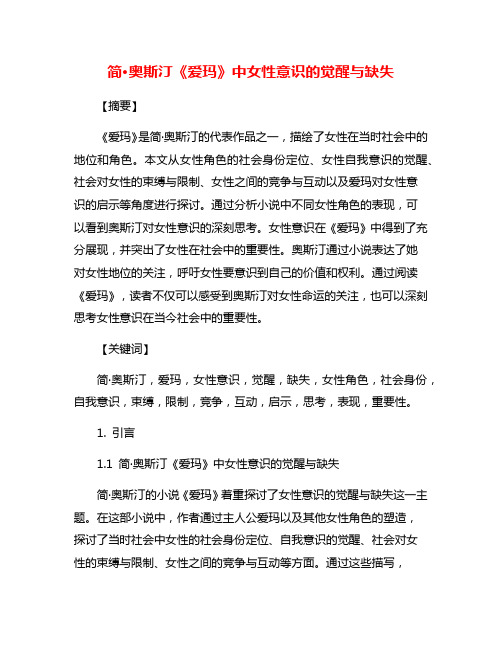
简·奥斯汀《爱玛》中女性意识的觉醒与缺失【摘要】《爱玛》是简·奥斯汀的代表作品之一,描绘了女性在当时社会中的地位和角色。
本文从女性角色的社会身份定位、女性自我意识的觉醒、社会对女性的束缚与限制、女性之间的竞争与互动以及爱玛对女性意识的启示等角度进行探讨。
通过分析小说中不同女性角色的表现,可以看到奥斯汀对女性意识的深刻思考。
女性意识在《爱玛》中得到了充分展现,并突出了女性在社会中的重要性。
奥斯汀通过小说表达了她对女性地位的关注,呼吁女性要意识到自己的价值和权利。
通过阅读《爱玛》,读者不仅可以感受到奥斯汀对女性命运的关注,也可以深刻思考女性意识在当今社会中的重要性。
【关键词】简·奥斯汀,爱玛,女性意识,觉醒,缺失,女性角色,社会身份,自我意识,束缚,限制,竞争,互动,启示,思考,表现,重要性。
1. 引言1.1 简·奥斯汀《爱玛》中女性意识的觉醒与缺失简·奥斯汀的小说《爱玛》着重探讨了女性意识的觉醒与缺失这一主题。
在这部小说中,作者通过主人公爱玛以及其他女性角色的塑造,探讨了当时社会中女性的社会身份定位、自我意识的觉醒、社会对女性的束缚与限制、女性之间的竞争与互动等方面。
通过这些描写,简·奥斯汀展现了女性在当时社会中的处境和挣扎,同时也反映了女性在不同社会背景下的成长和发展。
在小说中,女性角色的社会身份定位经常受到社会规范和传统观念的限制,她们需要不断面对来自外界的压力和质疑。
随着故事的发展,一些女性角色逐渐意识到自己的独立性和自主性,开始为自己的权利和尊严而奋斗。
这种自我意识的觉醒是女性意识的一种重要表现,也是作者对女性角色进行人性化描写的体现。
2. 正文2.1 女性角色的社会身份定位《爱玛》中女性角色的社会身份定位是一个重要的主题,简·奥斯汀通过这些角色展现了当时社会对女性的定位及其影响。
主人公爱玛是一个富有、受过良好教育、充满自信的年轻女性,她在社会中享有显赫的地位和尊重。
慢时光里的人情:再读《爱玛》

慢时光里的人情:再读《爱玛》作者:徐春叶来源:《新丝路(下旬)》2018年第10期摘要:简·奥斯丁的《爱玛》是一部受读者喜爱的经典佳作,文中主人公爱玛是一位漂亮、聪明、富有、热情的年轻姑娘。
小说以爱玛为中心展开,描写了英国乡村的亲情、友情、邻里之情、爱情,为读者呈现出一幅舒缓优美的田园画卷。
关键词:《爱玛》;简·奥斯丁;人情简·奥斯丁(后简称奥斯丁)是英国伟大的女作家,为后人留下了六部完整的作品,分别為:《理智与情感》、《傲慢与偏见》、《曼斯菲尔德庄园》、《爱玛》、《劝导》以及《诺桑觉寺》。
奥斯丁的小说都是以英国乡村为叙事背景,她以独特的、细腻的手法描写主人公看似琐碎的生活细节:交谈、聚餐、茶会、舞会等,读者从这些细节中感受到奥斯丁诙谐幽默的语言魅力和二百多年前英国特有的世态人情。
《爱玛》的主人公爱玛是个“又漂亮,又聪明,又有钱”的年轻小姐,由于具有这般得天独厚的条件,不禁有点“自视过高”,因而喜欢“随心所欲”。
她自己打定主意不结婚,却热衷于给别人牵线搭桥。
而她给别人做媒,每每不是“按照情理”,而是“凭着异想天开或一时冲动”,乱点鸳鸯谱,结果闹出很多笑话,吃了不少苦头。
不过,爱玛虽然没给别人撮合成一门亲事,但她自己最后却坠入了情网,与奈特利先生喜结良缘,跟另外两队青年男女一起,构成了《爱玛》的喜剧结局。
[1]一、爱玛的亲情爱玛·伍德豪斯家是海伯里的富裕人家,爱玛的母亲去世很早,但是贤惠的家庭教师泰勒小姐给了姐妹俩慈母般的爱,姐姐伊莎贝拉出嫁后,泰勒小姐与爱玛更是“情同手足,真比亲姐妹还亲。
”“泰勒小姐性情温和,即使名义上还是家庭教师时,也很少去管束爱玛。
后来师生关系彻底消失了,两人像知心朋友一样生活在一起”,对爱玛而言泰勒小姐亦师亦友亦母,在她生命中扮演着不是亲人胜似亲人的角色。
泰勒小姐后来嫁给了韦斯顿先生成为了韦斯顿太太,但是两家挨得很近,仍然保持着非常密切的关系。
爱玛的性格分析
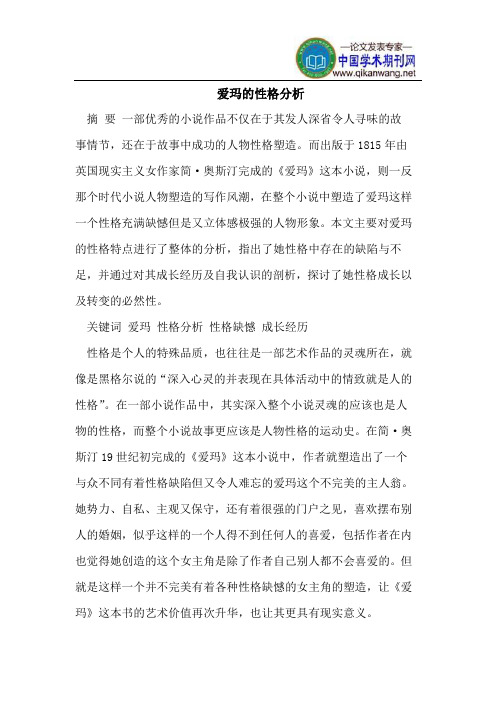
爱玛的性格分析摘要一部优秀的小说作品不仅在于其发人深省令人寻味的故事情节,还在于故事中成功的人物性格塑造。
而出版于1815年由英国现实主义女作家简·奥斯汀完成的《爱玛》这本小说,则一反那个时代小说人物塑造的写作风潮,在整个小说中塑造了爱玛这样一个性格充满缺憾但是又立体感极强的人物形象。
本文主要对爱玛的性格特点进行了整体的分析,指出了她性格中存在的缺陷与不足,并通过对其成长经历及自我认识的剖析,探讨了她性格成长以及转变的必然性。
关键词爱玛性格分析性格缺憾成长经历性格是个人的特殊品质,也往往是一部艺术作品的灵魂所在,就像是黑格尔说的“深入心灵的并表现在具体活动中的情致就是人的性格”。
在一部小说作品中,其实深入整个小说灵魂的应该也是人物的性格,而整个小说故事更应该是人物性格的运动史。
在简·奥斯汀19世纪初完成的《爱玛》这本小说中,作者就塑造出了一个与众不同有着性格缺陷但又令人难忘的爱玛这个不完美的主人翁。
她势力、自私、主观又保守,还有着很强的门户之见,喜欢摆布别人的婚姻,似乎这样的一个人得不到任何人的喜爱,包括作者在内也觉得她创造的这个女主角是除了作者自己别人都不会喜爱的。
但就是这样一个并不完美有着各种性格缺憾的女主角的塑造,让《爱玛》这本书的艺术价值再次升华,也让其更具有现实意义。
一、《爱玛》作品及相关争议简介《爱玛》是出生于18世纪末的英国现实主义女作家简·奥斯汀的得意作品之一,在英国文学长廊中具有显著的地位,但是这部作品也是其最受争议的一部。
简·奥斯汀在《爱玛》这部小说创作中,主要是以19世纪初的英国为大背景,然后通过对海伯里小村中的女主人翁爱玛以及村中的几个人物之间的关系的描述,刻画了当时英国中产阶级社会的众生相。
这部作品与其它同时期的作品有着很大的不同,也一直以来备受争议。
因为在整个作品中,简·奥斯汀塑造的并不是一个温柔、善良有着完美个性的女主人翁,而是一个势力、自私、主观并且保守的充满着缺陷的女主角。
从成长小说角度分析《爱玛》中女性的成长

- 248-校园英语 / 文艺鉴赏从成长小说角度分析《爱玛》中女性的成长三亚学院/胡翩翩【摘要】《爱玛》是简•奥斯汀所写的第五部小说,也可称为她的巅峰之作——其写作手法更为成熟,在人物塑造方面也更有深度。
从小说样式来看,该作品可被定义为成长小说。
小说的主人公爱玛起初是一个自以为是的富家小姐,她经常对别人的感情,尤其是她贴身侍女哈丽特的婚事指手画脚。
小说以爱玛的“乱点鸳鸯谱”为情节推动力,详细描述了爱玛在经历了一系列错误后逐渐走向了成熟,尤其在人格和道德上成长较大。
在对爱玛的成长进行描写的同时,作者的笔触也记录了小说的另一女性人物——哈丽特的成长,她的成长作为爱玛的成长镜面投射并给予有力的支撑。
本文将首先介绍成长小说,进而分析在该小说中主人公爱玛所经历的三个成长阶段,并从社会和道德的角度分析其成长的原因与局限性。
最后旨在告诉读者女性的成长对整个社会的积极意义所在。
【关键词】简•奥斯汀 成长小说 爱玛 人格 道德《爱玛》是简•奥斯汀的第五部小说,作者于 1814 年动笔,1815 年完稿。
在知名度上,《爱玛》并不像《傲慢与偏见》那样为众人熟知,但在描写世态众生上,她比别的作品更有深度,因而被不少评论家视为作者最成熟的小说。
奥斯汀本人认为,爱玛是“一位除了我自己外谁也不会非常喜欢的女主人公”。
在该小说中,主人公爱玛是一个好给人做媒的富家小姐,小说以此为主要情节推动力,通过描写爱玛为侍女哈丽特寻找理想结婚对象的过程,以及在此过程中爱玛因为一次又一次的的犯错,最终在自我反省及奈特利先生的帮助下,爱玛渐渐成熟,成长起来。
一、成长小说的定义及特点1.成长小说的定义。
成长小说亦称启蒙小说(novel of initiation),此概念最初源于德国,是西方近代文学中颇重要也常见的一个类型。
简单说来,这类小说处理的是主角自幼年或少年至成年、自天真无知至成熟世故的历练过程:或许进入社会吃亏吃苦而逐渐明白世途艰难人心险恶,或许经历某个或某些重大事件而使人生有所领悟有所改变;而在这番领悟和改变完成之际,故事亦到达(圆满的,或虽不圆满但尚称释然的)尾声。
自我反省与救赎成长——电影《爱玛》的主题研究
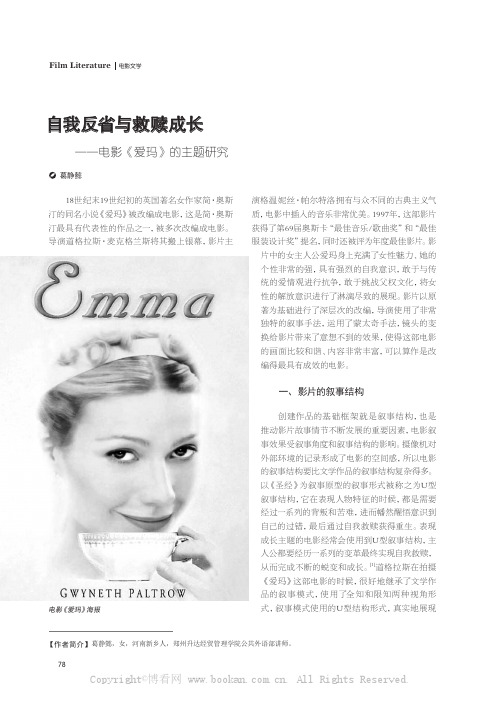
78电影文学Film Literature18世纪末19世纪初的英国著名女作家简·奥斯汀的同名小说《爱玛》被改编成电影,这是简·奥斯汀最具有代表性的作品之一,被多次改编成电影。
导演道格拉斯·麦克格兰斯将其搬上银幕,影片主演格温妮丝·帕尔特洛拥有与众不同的古典主义气质,电影中插入的音乐非常优美。
1997年,这部影片获得了第69届奥斯卡“最佳音乐/歌曲奖”和“最佳服装设计奖”提名,同时还被评为年度最佳影片。
影片中的女主人公爱玛身上充满了女性魅力、她的个性非常的强,具有强烈的自我意识,敢于与传统的爱情观进行抗争,敢于挑战父权文化,将女性的解放意识进行了淋漓尽致的展现。
影片以原著为基础进行了深层次的改编,导演使用了非常独特的叙事手法,运用了蒙太奇手法,镜头的变换给影片带来了意想不到的效果,使得这部电影的画面比较和谐、内容非常丰富,可以算作是改编得最具有成效的电影。
一、 影片的叙事结构创建作品的基础框架就是叙事结构,也是推动影片故事情节不断发展的重要因素,电影叙事效果受叙事角度和叙事结构的影响。
摄像机对外部环境的记录形成了电影的空间感,所以电影的叙事结构要比文学作品的叙事结构复杂得多。
以《圣经》为叙事原型的叙事形式被称之为U型叙事结构,它在表现人物特征的时候,都是需要经过一系列的背叛和苦难,进而幡然醒悟意识到自己的过错,最后通过自我救赎获得重生。
表现成长主题的电影经常会使用到U型叙事结构,主人公都要经历一系列的变革最终实现自我救赎,从而完成不断的蜕变和成长。
[1]道格拉斯在拍摄《爱玛》这部电影的时候,很好地继承了文学作品的叙事模式,使用了全知和限知两种视角形式,叙事模式使用的U型结构形式,真实地展现【作者简介】葛静懿,女,河南新乡人,郑州升达经贸管理学院公共外语部讲师。
自我反省与救赎成长——电影《爱玛》的主题研究葛静懿电影《爱玛》海报2016年第21期了爱玛历经的磨难,最终抛弃幻想,在奈特利先生的帮助下实现了人生的救赎并不断成长起来。
《爱玛》电影影评

《爱玛》电影影评电影如同一幅绚丽多彩的油画,其质地美妙绝伦,将英国乡村的自然之美展现得淋漓尽致,仿佛是动漫特效下绽放的小巧可爱的花朵。
简·奥斯丁的作品不仅仅是关于爱情,这一点在《爱玛》中表现得尤为明显。
当爱玛第一次见到奈特利先生时,她匆匆跑去弹奏钢琴,还不时往客厅偷看,这些细节都表明她对他有着特殊的感觉。
爱玛并非完美无缺,正如奈特利先生所言,她自负且虚荣,但她的虚荣并非源于自身的健康和美貌,而是来自于她的出身和财富。
优渥的家庭背景使她过分自负,有时无法理解穷人的处境,但她始终保持着善良的本性。
当她对贝茨小姐说错话时,她能够真诚地道歉,展现出她的善良和悔过之心。
这部电影的笔触主要集中在爱玛和奈特利先生身上,与 2009 年的电视剧版相比,对简·费尔法克斯的描写有所减少,她身上因贫穷而产生的怯懦也减弱了许多。
然而,我非常喜欢电影中简·费尔法克斯在艾玛家弹钢琴的场景。
作为一个经常被夸赞的人,她深知自己在各方面都比不上爱玛,因此坐在钢琴前弹奏的那一刻,更像是一个浑身泥泞的小丑竭尽全力地展示自己,那种贫苦女孩高傲而不被重视,最终只能在音乐中寻找自尊、短暂成为焦点的可悲,在钢琴曲中得到了深刻的体现。
此外,电影中还带有一些戏剧色彩(不知这样形容是否恰当),其中一些严肃、无厘头和手忙脚乱的场景常常让我忍俊不禁。
关于服装和场景,由于我了解有限,就不多加赘述了。
我注意到有人对电影中舞会在清晨结束以及艾玛为何在舞会回家后脱了一双鞋里面还穿着另一双等历史细节进行了解释,这些对细节的追求让我感到非常惊喜。
因此,我完全认同《爱玛》是简·奥斯丁具有现实主义的作品。
从社交礼仪到英国乡村的真实面貌,简·奥斯丁的作品之所以能在今天仍具有如此巨大的影响力,绝不仅仅是因为爱情。
在爱情的外壳下,她还描绘了什么,我们还有很多的解读空间。
《爱玛》电影影评

《爱玛》电影影评电影中的服装设计和场景布置令人赞叹不已。
无论是艾玛的华丽礼服还是乡村庄园的美景,都营造出了浓郁的维多利亚时代氛围。
这些视觉上的享受无疑增加了观众的观影体验,但对于故事的推动并没有起到太大的作用。
影片的故事情节主要围绕着女主角艾玛展开。
艾玛是一个自诩为贵族的大小姐,她热衷于为身边的人牵线搭桥,却常常弄巧成拙。
她的行为和言语有时让人感到讨厌,尤其是她对他人的偏见和自以为是的态度,让人难以产生共鸣。
然而,随着剧情的发展,艾玛逐渐意识到自己的错误,并努力改正。
这一成长过程展现得相对仓促,缺乏足够的细节和情感铺垫,使得角色的转变显得有些突兀。
电影中的爱情线索也是一大看点。
艾玛对一位神秘男士一见钟情,但随着剧情的推进,观众发现这个神秘男士竟然是曾经与她针锋相对的男主角奈特利先生。
两人的感情发展虽然充满了波折,但也显得有些过于顺利。
他们之间的爱情火花似乎来得过于突然,缺乏足够的铺垫和情感积累。
此外,电影中的一些情节和人物发展也让人感到困惑。
例如,那个从头就提到但一直没有出现的男人,直到影片接近尾声时才突然出现,这种悬念的设置并没有给观众带来太多的惊喜,反而让人觉得有些牵强。
而女主角的一些行为和决策也让人难以理解,她的自以为是和固执己见在某些时候显得过于夸张,与她的贵族身份并不相符。
尽管存在这些不足之处,电影《爱玛》依然有其值得欣赏的地方。
影片中的演员表现出色,尤其是艾玛的扮演者,她成功地诠释了这个角色的复杂性和多面性。
她的表演既有大小姐的傲慢,又有内心的善良和成长的痛苦,让人对这个角色爱恨交织。
此外,电影中的幽默元素也为影片增添了不少趣味。
艾玛的幽默言辞和滑稽行为常常引发观众的笑声,使影片在情感起伏之间保持了一定的轻松氛围。
电影《爱玛》是一部制作精良的作品,但在剧情和人物塑造方面存在一些不足之处。
它试图展现爱情、友情和成长的主题,但在表达上显得有些肤浅和仓促。
对于喜欢浪漫喜剧的观众来说,这部电影可能会带来一些欢乐和感动,但对于那些对剧情和人物有更高要求的观众来说,可能会觉得有些失望。
名著爱玛读后感范文
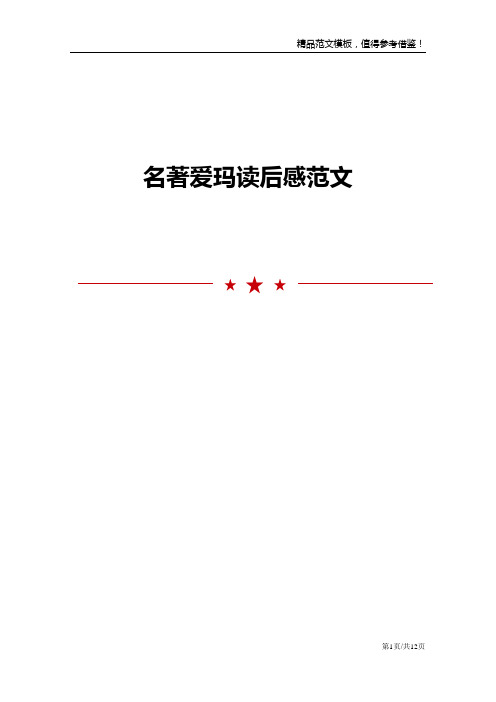
名著爱玛读后感范文名著爱玛读后感范文这本书描绘了少女待嫁,憧憬社交舞会的懵懂春心。
但是只有Emma从未牵涉这些,早早宣布自己无心嫁人,全心做一名旧时代的媒婆。
给本书换个名字或许更贴切—“哈特菲尔德的啼笑因缘”。
在这里给大家带来名著爱玛读后感范文5篇,希望大家喜欢!名著爱玛读后感范文1读这部小说对爱玛感觉一般甚至不太喜欢印象最深刻又最打动心的是Mr Knightley。
对于爱玛这样各方面得天独厚笑起来就会融化所有人的心的姑娘来说真是没有什么能够阻挠她。
她不必屈从于社会给女性的命运(通过嫁人或者继承遗产来获得财富)而是可以完全自主的决定自己的来去。
身边的所有人,家庭教师,父亲,朋友都对她宠溺怜惜,甚至在她对MrsBates语出不驯(but theres a number limit, you cant tell more than three dullthings)后,依仗她生活的Mrs Bates也只是自己落泪并不敢对她表示任何。
再这样一个快把这里变成以Emma为中心的小天地里,Mr Knightley的出现真是一股清风,吹散乌云,点醒Emma。
Mr Knightley不仅仅是作为Emma的爱人,他在某种意义上,创造了新的爱玛,而爱玛接受了他的创造。
从来不觉得腻歪而着迷于浅层次的情爱的感情可以长久至少有一方是要被心甘情愿的改变和升华的。
同时这一切都要建立在尊重的基础上。
这是我心中美好的爱情——我被你彻底改变成一个我也想成为的人。
还有这部电影的配乐实在太特么好听了舞会上Emma和奈特莉先生跳舞的那段儿被美的鸡皮疙瘩都起来了真的太好听了打算把这首曲子纳入自己的婚礼里了名著爱玛读后感范文2理智与情感英国人戴维·洛奇在《小世界》里替莫里斯教授的一对儿女起名叫达西和伊丽莎白。
由熟悉《傲慢与偏见》的人看来,这未免有一点乱伦的意味。
简·奥斯丁活了42岁,一共写了6篇小说,统统是关于适当的婚姻与适当的爱情。
《爱玛》读后感:成长、爱情与社会风俗的细腻描绘

《爱玛》读后感:成长、爱情与社会风俗的细腻描绘引言:简·奥斯汀的《爱玛》是一部描绘19世纪英国乡村社会的经典小说。
通过主人公爱玛·伍德豪斯的故事,这部作品不仅展示了作者对人性的深刻洞察,也反映了当时社会的风俗习惯和婚姻观念。
阅读这部小说,我深受启发,以下是我的一些感悟。
正文:一、爱玛的成长之旅爱玛是一个聪明、独立但有些自负的年轻女子。
她的性格复杂,有着自己的优点和缺点。
在小说中,爱玛经历了一系列的误解和挫折,最终实现了自我反省和成长。
她的故事让我认识到,每个人都需要不断地自我改进和学习,以成为更好的自己。
二、婚姻观的深刻探讨小说中对婚姻的探讨非常深刻。
爱玛最初对婚姻持有轻率的态度,但随着故事的发展,她逐渐认识到真正的爱情和婚姻需要相互理解和尊重。
这让我思考了婚姻的真正意义,以及如何在爱情和婚姻中找到平衡和幸福。
三、丰富多彩的角色群像《爱玛》中的其他角色,如凯瑟琳·莫兰、哈丽特·史密斯和乔治·奈特利等,都具有鲜明的个性。
他们的故事与爱玛的成长相互交织,为小说增添了丰富的层次。
特别是乔治·奈特利先生,他的智慧和深情最终赢得了爱玛的心,展现了爱情的力量。
四、讽刺手法的巧妙运用简·奥斯汀在小说中巧妙地运用了讽刺手法,对当时的社会阶级观念和婚姻观念进行了温和的批评。
她的文字幽默而尖锐,让人在轻松愉快的阅读中思考社会现象背后的深层含义。
五、生动的社会风俗描写小说中对19世纪英国乡村社会的细节描写非常精彩。
从日常生活到社交场合的礼仪,奥斯汀为我们描绘了一幅幅生动的社会画卷。
这些细节不仅增加了故事的真实性,也让读者仿佛置身于那个时代。
六、人物的立体性和成长变化爱玛的成长和改变展现了人物的立体性。
她从一个有些自私和任性的年轻女子,成长为一个更加成熟、懂得爱的女性。
这个过程不仅对她自己有着重要意义,也对周围的人产生了积极影响。
结论:《爱玛》是一部值得细细品味的小说。
《爱玛》阅读感悟

《爱玛》阅读感悟《爱玛》阅读感悟1爱玛是一个又聪明、又漂亮、又富有的二十出头的女子,也许是因为人生中令人羡慕的一切她都拥有了,所以她有些自负,总是以自己的主观臆想去“乱点鸳鸯谱”。
当然事与愿违,生活中她并不是月老。
有情人终成眷属。
她却因为事情没有照她所想的那样发展而失落,并且对好言规劝她的姐夫的哥哥心怀不满。
当然最终结果是她明白了自己的无知,并且和那个一直爱着她,又一直批评她的人结为夫妻。
感觉上就是一本英国的青春小说,但在浪漫当中又不乏现实的意义,爱情还是需要门当户对。
爱玛以为牧师爱上了某某小姐(一位来历不明的私生女),直到牧师快要结婚的时候爱玛问他为什么不娶她的时候,牧师说我怎么会看上她!牧师看上的是爱玛,但他每次向爱玛示好的时候偏偏都有某某小姐在场,结果导致了一连串误会。
像有一次爱玛给那位姑娘画了一幅画,结果牧师大加赞赏,爱玛误以为是牧师对那位姑娘有意思,但事实是牧师在拍爱玛的马屁。
牧师确是一个很庸俗的人,典型的势利眼,最后娶了另一位庸俗的势利眼(真般配)。
而某某小姐,最终还是嫁给了一位农夫,一位很爱她的农夫。
语言上相当有趣味性,轻松活泼。
与奥斯汀之前的作品一样,这本看似很偶像的书也讲了许多人生哲理。
比如家世背景毕竟是现实的,某某小姐最终还是要嫁给一位农夫。
而且也对爱玛随便干涉他人婚姻的行为进行了批评。
《爱玛》阅读感悟2这个暑假,我选择了在图书馆打发时间。
有一天,我借回了一本名叫《爱玛》的书。
这本书讲了一个少女爱玛因为自己家在当地很受人敬重,所以自己也有一点威望。
因此,滋生出许多缺点,而她自己却不知道。
于是爱玛就开展了一场艰苦而又漫长的认识自我的旅程,并经历了许多苦难,正是这些苦难让她清楚的知道了自己的缺点,将它们改正,并也因为改掉了缺点而嫁给了远近闻名的奈特利先生,获得了幸福。
这本书里的爱玛就和我们一样,有许多缺点需要改正,而自己却“被蒙在鼓里”。
有缺点固然不好,而知道缺点不改正还拼命掩饰就更恶劣,就像一个童话寓言故事里的猫一样:这只猫什么也不会,捉不到老鼠反而说自己嫌老鼠瘦而将它放走,不吃,这只猫就这样继续掩盖它的错误;有一天它掉进泥潭里却不让同伴救,说它在游泳,终于被淹死了。
简·奥斯汀《爱玛》中女性意识的觉醒与缺失
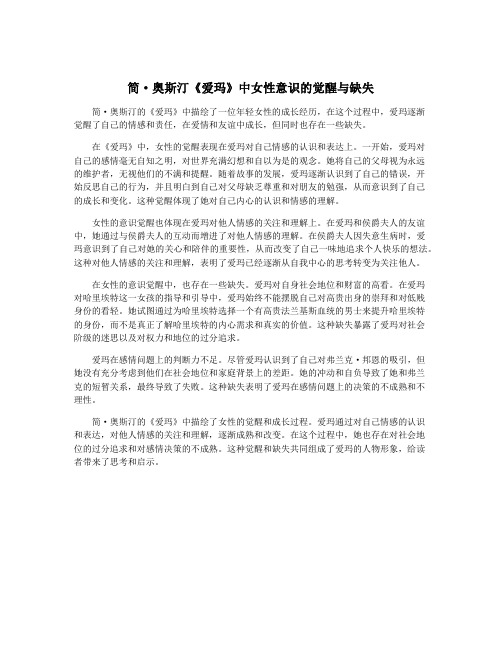
简·奥斯汀《爱玛》中女性意识的觉醒与缺失简·奥斯汀的《爱玛》中描绘了一位年轻女性的成长经历,在这个过程中,爱玛逐渐觉醒了自己的情感和责任,在爱情和友谊中成长,但同时也存在一些缺失。
在《爱玛》中,女性的觉醒表现在爱玛对自己情感的认识和表达上。
一开始,爱玛对自己的感情毫无自知之明,对世界充满幻想和自以为是的观念。
她将自己的父母视为永远的维护者,无视他们的不满和提醒。
随着故事的发展,爱玛逐渐认识到了自己的错误,开始反思自己的行为,并且明白到自己对父母缺乏尊重和对朋友的勉强,从而意识到了自己的成长和变化。
这种觉醒体现了她对自己内心的认识和情感的理解。
女性的意识觉醒也体现在爱玛对他人情感的关注和理解上。
在爱玛和侯爵夫人的友谊中,她通过与侯爵夫人的互动而增进了对他人情感的理解。
在侯爵夫人因失意生病时,爱玛意识到了自己对她的关心和陪伴的重要性,从而改变了自己一味地追求个人快乐的想法。
这种对他人情感的关注和理解,表明了爱玛已经逐渐从自我中心的思考转变为关注他人。
在女性的意识觉醒中,也存在一些缺失。
爱玛对自身社会地位和财富的高看。
在爱玛对哈里埃特这一女孩的指导和引导中,爱玛始终不能摆脱自己对高贵出身的崇拜和对低贱身份的看轻。
她试图通过为哈里埃特选择一个有高贵法兰基斯血统的男士来提升哈里埃特的身份,而不是真正了解哈里埃特的内心需求和真实的价值。
这种缺失暴露了爱玛对社会阶级的迷思以及对权力和地位的过分追求。
爱玛在感情问题上的判断力不足。
尽管爱玛认识到了自己对弗兰克·邦恩的吸引,但她没有充分考虑到他们在社会地位和家庭背景上的差距。
她的冲动和自负导致了她和弗兰克的短暂关系,最终导致了失败。
这种缺失表明了爱玛在感情问题上的决策的不成熟和不理性。
简·奥斯汀的《爱玛》中描绘了女性的觉醒和成长过程。
爱玛通过对自己情感的认识和表达,对他人情感的关注和理解,逐渐成熟和改变。
在这个过程中,她也存在对社会地位的过分追求和对感情决策的不成熟。
《爱玛救赎中的成长从成长小说的角度解读《爱玛》中的道德观
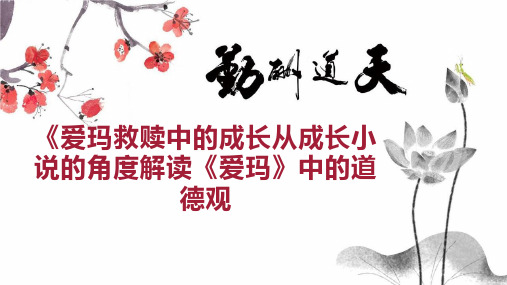
基本内容
在《爱玛》这部小说中,成长是一个与救赎紧密相连的主题。爱玛在自我救 赎的过程中,也不断地成长和进步。她从一个任性和自负的年轻女子,逐渐变成 了一个懂得自省和理解他人的成熟女性。在与哈丽埃特、奈特利先生等人的交往 中,她不断地领悟到人性的复杂性和丰富性,也认识到了自己的局限和不足之处。 通过这些经历,爱玛逐渐学会了谦逊、宽容和同情心等品质,成为了一个更加完 整和充实的人。
《爱玛》:简·奥斯汀的女性主义观
在《爱玛》中,奥斯汀以女性的视角,刻画出了一个生动而立体的女性形象。 爱玛并不只是一个富有姑娘,她的富有并非来自于家庭背景,而是来自于她的智 慧和独立的性格。她有足够的自信去主导自己的生活,有足够的勇气去追求自己 的幸福。在这一点上,奥斯汀塑造了一个真正意义上的“新女性”形象。
《爱玛》:简·奥斯汀的女性主义观
在小说中,爱玛最终认识到了自己的缺点并改正了它们,最终也找到了自己 的幸福。这表明奥斯汀认为,女性只有通过认识自我、改正缺点并独立自主才能 获得真正的幸福。这种思想对于当时的社会来说是具有挑战性的,因为当时的社 会对女性的期望是顺从和依赖。
《爱玛》:简·奥斯汀的女性主义观
基本内容
在这个过程中,她意识到了自己的错误,并通过自我反省和向他人求助,最 终实现了自我救赎。
基本内容
爱玛的救赎过程并不是一帆风顺的。她曾经因为自己的错误而陷入深深的悔 恨和痛苦中。然而,在这个过程中,她也开始思考自己的生活和价值观。在与奈 特利先生的对话中,她认识到了自己的骄傲和自负,并逐渐克服了这些缺点。同 时,她还通过帮助他人在生活中找到了意义和价值,从而逐渐找到了自己生活的 方向。在这个过程中,爱玛不断地成长和进步,最终实现了自我救赎和成长。
2、人际关系的变化
合作原则质的准则视角下《爱玛》的会话含义分析

合作原则质的准则视角下《爱玛》的会话含义分析《爱玛》是简·奥斯汀的代表作之一,它讲述了一个年轻女性爱玛的成长故事。
在小说中,爱玛的生活受到了家庭和社会的束缚,但她最终通过自我认知和成熟的观点改变了自己的生活。
在小说中,合作原则的质的准则视角下,我们可以发现许多关于人际关系、自我认知和成长的深刻含义。
从人际关系的角度来看,《爱玛》中的人际关系可以被理解为一种合作的过程。
爱玛与她周围的人之间存在着错综复杂的关系,她与家人、朋友、邻居甚至家仆之间都存在着各种不同的合作关系。
在这些关系中,每个人都有自己的期许和需求,而这些期许和需求的协调和满足需要一定的合作。
而这种合作要建立在相互尊重和理解的基础上,只有这样才能够使人际关系变得更加和谐和稳定。
从自我认知的角度来看,《爱玛》中的爱玛通过与周围的人交往和互动,逐渐认识到了自己的缺点和不足,从而逐渐成长和成熟。
在小说中,爱玛一开始是一个自负、盲目自信的年轻女性,她总是以自己的感受和看法来评判周围的人和事。
随着与周围的人的交往,尤其是与好友哈里埃特和导师奈特利的交往,爱玛逐渐认识到了自己的盲点和不足之处,从而开始反思和改变自己。
这种自我认知和改变是爱玛成长的关键,也是人在合作中不断完善自己的一个重要部分。
从成长的角度来看,《爱玛》中所洋溢的一种互助和进步的氛围可以被理解为一种合作的成长过程。
在小说中,爱玛周围的人都在不同程度上影响和帮助着她成长。
他们通过自己的言行和行为,引导着爱玛不断地认识自己、改变自己,并最终实现自己的成长和进步。
在这个过程中,每个人都在合作中扮演着不同的角色,他们都在合作中获得了成长和进步。
这种共同成长的过程不仅是爱玛个人的成长过程,更是整个社会共同进步的过程。
《爱玛》中的合作原则的质的准则视角下的会话含义分析可以帮助我们更好地理解小说中所呈现的人际关系、自我认知和成长的深刻含义。
在这些含义中,我们可以看到合作是人与人之间合作的基础,自我认知是合作的前提,而共同进步则是合作的目标。
再论《爱玛》中爱玛的自我认识马蓉

西北师范大学硕士学位论文再论《爱玛》中爱玛的自我认识马蓉姓名:马蓉申请学位级别:硕士专业:比较文学与世界文学指导教师:李晓卫2008-05摘要《爱玛》中描写女主人公认识与自我认识的成分是显而易见的,以往的研究成果中对这一问题也有触及,但又往往一带而过。
研究者们通常根据文本表面的叙事程序来看待《爱玛》中女主人公自我认识的问题,而文本深层女主人公矛盾的内心世界则关注不够。
就目前的研究现状来看,研究者们一致认为《爱玛》(包括其他5部作品)中女主人公自我认识的难题最后都在爱情大团圆的结局中得到了解决(或部分得到解决)。
本文提出的论点恰恰与这一结论相背离。
本文首次将《爱玛》中人物的自我认识作为一个独立的问题加以讨论,试图从人物心理出发,立足文本,梳理文本中影响爱玛自我认知的各种因素,对这些因素可能起到的影响与作用进行论证,从而证实《爱玛》中爱玛的自我认识永远无法完成这一中心论点,以期挖掘爱玛自我认识背后的深层意蕴。
本论文从三个方面对此中心论点进行论证。
一、自我认识的不确定性。
周围亲朋对爱玛的追捧和利用导致了爱玛自我认知的偏差;爱玛自身的理性思维无法与她的好奇心及统治欲抗衡,是“思”与“行”的矛盾。
二、自我认识的否定性。
以拉康的“镜像原理”中“他者”的定义及女权主义对“他者”的分析为立足点,分析爱玛与奈特利先生的对立关系——爱玛的自我认识因为对奈特利这个“他者”持否定心理而呈现出否定态势。
三、自我认识的“盲点”。
这一部分着重论述阶级身份对爱玛思维的限制。
通过对文本中与爱玛具有对应关系的女性角色在爱玛心目中地位的分析,折射出爱玛的道德缺陷,反映了爱玛因阶级身份的限制永远也无法看到自身的缺点,即自我认识的盲点。
关键词:简・奥斯丁爱玛自我认识不确定性AbstractIt is obvious that there are some components which describing the self-aware-ness and understanding of the heroine in Emma. Although in previous studies this issue was touched upon, but often was over the area. The researchers usually treat the issue of heroine’s self-awareness in Emma according to the narrative procedures of the surface of text, but the deep contradictions of the heroine’s inner world of text is concerned not enough.On the current status of the study, the researchers agreed that the problems of the heroine’s self-awareness have been resolved in the last love happy endings in Emma (including the other five entries).This paper presents the argument precisely against this conclusion. It discusses the character’s self-awareness in Emma as a separate issue at the first time, and attempts to start combing various factors which influencing the Emma’s self-awareness from the character’s psychology and on the base of text, and demonstrate the impact and role played by these factors, then confirms the central point in Emma that Emma’s self-understanding will never be completed,in order to mine the deep meaning underlying her self-awareness showed in the text.This paper discusses this central argument from three aspects. Firstly, the uncertainty of self-awareness: The friends’ persuing and using of Emma's have led to the deviation of her self-awareness; Emma's own rational thinking can not contend with her curiosity and desire to rule, this is the contradiction of "thinking" and "doing". Secondly, the negativity of self-awareness: Taking the definition of "the other" in Lacan’s "mirror principle" and the feminism’s analysis on"the other" as the foothold, analyzing the confrontation between Naite Li and Emma——Emma 's self-awareness shows a negative trend because of her holding a negative psychological to Naite Li——“the other”. Thirdly, the "blind spot" ofself-awareness: This section focuses on the restrictions of class status to Emma's thought. Through analysing the status of women roles which had correspondence with Emma in the eyes of Emma in the text, reflecting the moral deficiencies of Emma and showing that Emma will never be able to see her own shortcomings,namely the blind spot of self-Understanding ,because of the restrictions of class status.Key words:Jane·Austen Emma self-awareness uncertainty独创性声明本人声明所呈交的论文是我个人在导师指导下进行的研究工作及取得的研究成果。
《理性与情感的较量:《爱玛》中的自我认知探讨》
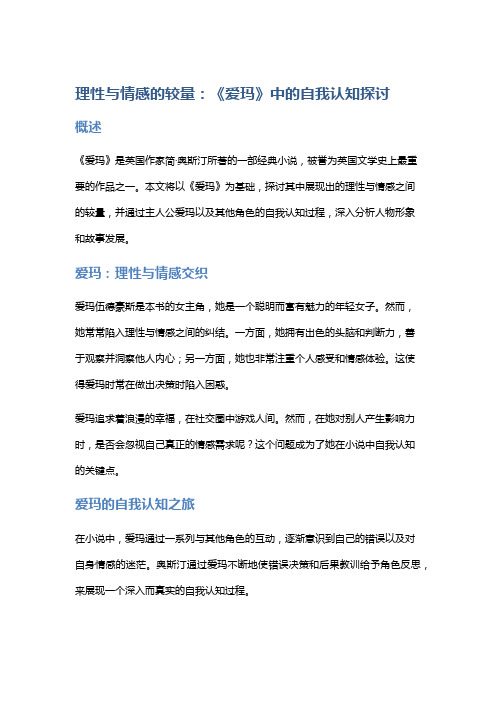
理性与情感的较量:《爱玛》中的自我认知探讨概述《爱玛》是英国作家简·奥斯汀所著的一部经典小说,被誉为英国文学史上最重要的作品之一。
本文将以《爱玛》为基础,探讨其中展现出的理性与情感之间的较量,并通过主人公爱玛以及其他角色的自我认知过程,深入分析人物形象和故事发展。
爱玛:理性与情感交织爱玛伍德豪斯是本书的女主角,她是一个聪明而富有魅力的年轻女子。
然而,她常常陷入理性与情感之间的纠结。
一方面,她拥有出色的头脑和判断力,善于观察并洞察他人内心;另一方面,她也非常注重个人感受和情感体验。
这使得爱玛时常在做出决策时陷入困惑。
爱玛追求着浪漫的幸福,在社交圈中游戏人间。
然而,在她对别人产生影响力时,是否会忽视自己真正的情感需求呢?这个问题成为了她在小说中自我认知的关键点。
爱玛的自我认知之旅在小说中,爱玛通过一系列与其他角色的互动,逐渐意识到自己的错误以及对自身情感的迷茫。
奥斯汀通过爱玛不断地使错误决策和后果教训给予角色反思,来展现一个深入而真实的自我认知过程。
爱玛最终意识到,理性与情感并非对立面,而是需要相互平衡。
她开始反思自己以往行为所带来的后果,并逐渐学会照顾他人的感受和需要。
其他角色对爱玛自我认知的影响除了主人公爱玛外,《爱玛》中还有许多其他角色对她的自我认知产生重要影响。
例如,她与好友哈里埃特之间的友谊,使得她更加理解到社会阶层、经济状况等因素对每个人都有影响,并且人们应该学会包容和尊重彼此。
同时,男主角克劳利先生也是推动爱玛认识到自己情感迷茫的关键角色。
他对爱玛真诚的喜欢以及对她后来的冷落,使得爱玛更加明白自己感情所在,并最终认识到自己追求浪漫的幻想并不实际。
结论《爱玛》这部小说通过爱玛自我认知的探索,展现了理性与情感之间的较量。
同时,通过主人公以及其他角色的故事发展和情感变化,向读者传递了一个生动而深入的思考身份、情感和社会关系等相关议题。
这种较量和自我认知过程不仅存在于小说中,同样也常常反映在现实生活中。
简·奥斯汀《爱玛》中女性意识的觉醒与缺失
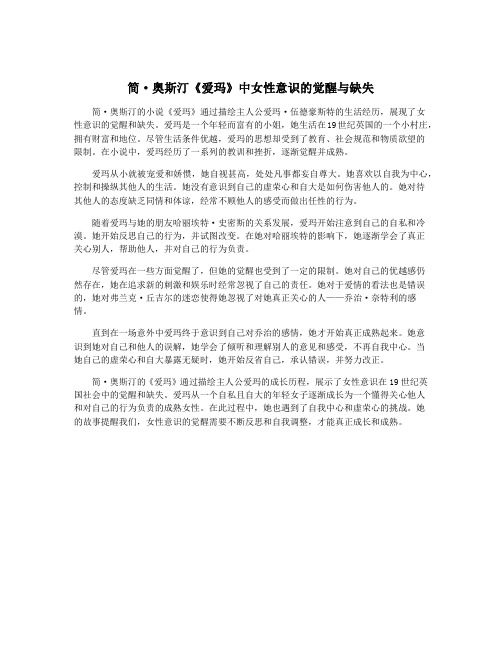
简·奥斯汀《爱玛》中女性意识的觉醒与缺失简·奥斯汀的小说《爱玛》通过描绘主人公爱玛·伍德豪斯特的生活经历,展现了女性意识的觉醒和缺失。
爱玛是一个年轻而富有的小姐,她生活在19世纪英国的一个小村庄,拥有财富和地位。
尽管生活条件优越,爱玛的思想却受到了教育、社会规范和物质欲望的限制。
在小说中,爱玛经历了一系列的教训和挫折,逐渐觉醒并成熟。
爱玛从小就被宠爱和娇惯,她自视甚高,处处凡事都妄自尊大。
她喜欢以自我为中心,控制和操纵其他人的生活。
她没有意识到自己的虚荣心和自大是如何伤害他人的。
她对待其他人的态度缺乏同情和体谅,经常不顾他人的感受而做出任性的行为。
随着爱玛与她的朋友哈丽埃特·史密斯的关系发展,爱玛开始注意到自己的自私和冷漠。
她开始反思自己的行为,并试图改变。
在她对哈丽埃特的影响下,她逐渐学会了真正关心别人,帮助他人,并对自己的行为负责。
尽管爱玛在一些方面觉醒了,但她的觉醒也受到了一定的限制。
她对自己的优越感仍然存在,她在追求新的刺激和娱乐时经常忽视了自己的责任。
她对于爱情的看法也是错误的,她对弗兰克·丘吉尔的迷恋使得她忽视了对她真正关心的人——乔治·奈特利的感情。
直到在一场意外中爱玛终于意识到自己对乔治的感情,她才开始真正成熟起来。
她意识到她对自己和他人的误解,她学会了倾听和理解别人的意见和感受,不再自我中心。
当她自己的虚荣心和自大暴露无疑时,她开始反省自己,承认错误,并努力改正。
简·奥斯汀的《爱玛》通过描绘主人公爱玛的成长历程,展示了女性意识在19世纪英国社会中的觉醒和缺失。
爱玛从一个自私且自大的年轻女子逐渐成长为一个懂得关心他人和对自己的行为负责的成熟女性。
在此过程中,她也遇到了自我中心和虚荣心的挑战。
她的故事提醒我们,女性意识的觉醒需要不断反思和自我调整,才能真正成长和成熟。
简·奥斯汀《爱玛》中女性意识的觉醒与缺失
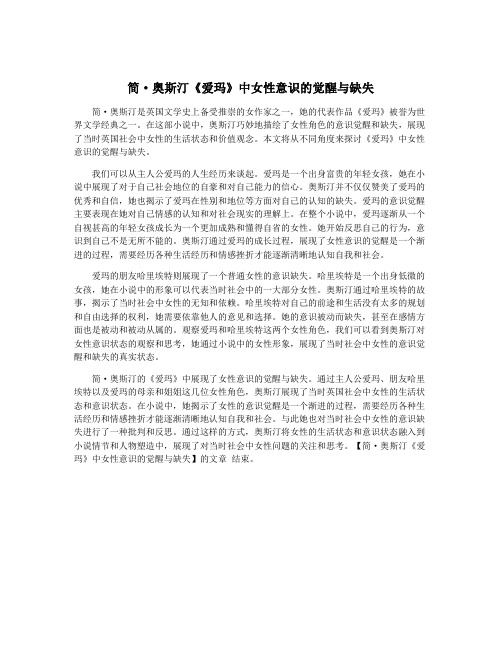
简·奥斯汀《爱玛》中女性意识的觉醒与缺失简·奥斯汀是英国文学史上备受推崇的女作家之一,她的代表作品《爱玛》被誉为世界文学经典之一。
在这部小说中,奥斯汀巧妙地描绘了女性角色的意识觉醒和缺失,展现了当时英国社会中女性的生活状态和价值观念。
本文将从不同角度来探讨《爱玛》中女性意识的觉醒与缺失。
我们可以从主人公爱玛的人生经历来谈起。
爱玛是一个出身富贵的年轻女孩,她在小说中展现了对于自己社会地位的自豪和对自己能力的信心。
奥斯汀并不仅仅赞美了爱玛的优秀和自信,她也揭示了爱玛在性别和地位等方面对自己的认知的缺失。
爱玛的意识觉醒主要表现在她对自己情感的认知和对社会现实的理解上。
在整个小说中,爱玛逐渐从一个自视甚高的年轻女孩成长为一个更加成熟和懂得自省的女性。
她开始反思自己的行为,意识到自己不是无所不能的。
奥斯汀通过爱玛的成长过程,展现了女性意识的觉醒是一个渐进的过程,需要经历各种生活经历和情感挫折才能逐渐清晰地认知自我和社会。
爱玛的朋友哈里埃特则展现了一个普通女性的意识缺失。
哈里埃特是一个出身低微的女孩,她在小说中的形象可以代表当时社会中的一大部分女性。
奥斯汀通过哈里埃特的故事,揭示了当时社会中女性的无知和依赖。
哈里埃特对自己的前途和生活没有太多的规划和自由选择的权利,她需要依靠他人的意见和选择。
她的意识被动而缺失,甚至在感情方面也是被动和被动从属的。
观察爱玛和哈里埃特这两个女性角色,我们可以看到奥斯汀对女性意识状态的观察和思考,她通过小说中的女性形象,展现了当时社会中女性的意识觉醒和缺失的真实状态。
简·奥斯汀的《爱玛》中展现了女性意识的觉醒与缺失。
通过主人公爱玛、朋友哈里埃特以及爱玛的母亲和姐姐这几位女性角色,奥斯汀展现了当时英国社会中女性的生活状态和意识状态。
在小说中,她揭示了女性的意识觉醒是一个渐进的过程,需要经历各种生活经历和情感挫折才能逐渐清晰地认知自我和社会。
与此她也对当时社会中女性的意识缺失进行了一种批判和反思。
《爱玛》中爱玛的人物形象分析 爱玛是怎样的人

《爱玛》中爱玛的人物形象分析爱玛是怎样的人(最新版)编制人:__________________审核人:__________________审批人:__________________编制单位:__________________编制时间:____年____月____日序言下载提示:该文档是本店铺精心编制而成的,希望大家下载后,能够帮助大家解决实际问题。
文档下载后可定制修改,请根据实际需要进行调整和使用,谢谢!并且,本店铺为大家提供各种类型的经典范文,如诗歌散文、原文赏析、读书笔记、经典名著、古典文学、网络文学、经典语录、童话故事、心得体会、其他范文等等,想了解不同范文格式和写法,敬请关注!Download tips: This document is carefully compiled by this editor.I hope that after you download it, it can help you solve practical problems. The document can be customized and modified after downloading, please adjust and use it according to actual needs, thank you!In addition, this shop provides you with various types of classic sample essays, such as poetry and prose, original text appreciation, reading notes, classic works, classical literature, online literature, classic quotations, fairy tales, experience, other sample essays, etc. if you want to know the difference Please pay attention to the format and writing of the sample essay!《爱玛》中爱玛的人物形象分析爱玛是怎样的人【导语】:奥斯汀《爱玛》是一部很经典的小说,关于爱玛的人物形象是怎样的一直受到关注,本店铺来给大家介绍爱玛是怎样的人。
- 1、下载文档前请自行甄别文档内容的完整性,平台不提供额外的编辑、内容补充、找答案等附加服务。
- 2、"仅部分预览"的文档,不可在线预览部分如存在完整性等问题,可反馈申请退款(可完整预览的文档不适用该条件!)。
- 3、如文档侵犯您的权益,请联系客服反馈,我们会尽快为您处理(人工客服工作时间:9:00-18:30)。
西北师范大学硕士学位论文再论《爱玛》中爱玛的自我认识马蓉姓名:马蓉申请学位级别:硕士专业:比较文学与世界文学指导教师:李晓卫2008-05摘要《爱玛》中描写女主人公认识与自我认识的成分是显而易见的,以往的研究成果中对这一问题也有触及,但又往往一带而过。
研究者们通常根据文本表面的叙事程序来看待《爱玛》中女主人公自我认识的问题,而文本深层女主人公矛盾的内心世界则关注不够。
就目前的研究现状来看,研究者们一致认为《爱玛》(包括其他5部作品)中女主人公自我认识的难题最后都在爱情大团圆的结局中得到了解决(或部分得到解决)。
本文提出的论点恰恰与这一结论相背离。
本文首次将《爱玛》中人物的自我认识作为一个独立的问题加以讨论,试图从人物心理出发,立足文本,梳理文本中影响爱玛自我认知的各种因素,对这些因素可能起到的影响与作用进行论证,从而证实《爱玛》中爱玛的自我认识永远无法完成这一中心论点,以期挖掘爱玛自我认识背后的深层意蕴。
本论文从三个方面对此中心论点进行论证。
一、自我认识的不确定性。
周围亲朋对爱玛的追捧和利用导致了爱玛自我认知的偏差;爱玛自身的理性思维无法与她的好奇心及统治欲抗衡,是“思”与“行”的矛盾。
二、自我认识的否定性。
以拉康的“镜像原理”中“他者”的定义及女权主义对“他者”的分析为立足点,分析爱玛与奈特利先生的对立关系——爱玛的自我认识因为对奈特利这个“他者”持否定心理而呈现出否定态势。
三、自我认识的“盲点”。
这一部分着重论述阶级身份对爱玛思维的限制。
通过对文本中与爱玛具有对应关系的女性角色在爱玛心目中地位的分析,折射出爱玛的道德缺陷,反映了爱玛因阶级身份的限制永远也无法看到自身的缺点,即自我认识的盲点。
关键词:简・奥斯丁爱玛自我认识不确定性AbstractIt is obvious that there are some components which describing the self-aware-ness and understanding of the heroine in Emma. Although in previous studies this issue was touched upon, but often was over the area. The researchers usually treat the issue of heroine’s self-awareness in Emma according to the narrative procedures of the surface of text, but the deep contradictions of the heroine’s inner world of text is concerned not enough.On the current status of the study, the researchers agreed that the problems of the heroine’s self-awareness have been resolved in the last love happy endings in Emma (including the other five entries).This paper presents the argument precisely against this conclusion. It discusses the character’s self-awareness in Emma as a separate issue at the first time, and attempts to start combing various factors which influencing the Emma’s self-awareness from the character’s psychology and on the base of text, and demonstrate the impact and role played by these factors, then confirms the central point in Emma that Emma’s self-understanding will never be completed,in order to mine the deep meaning underlying her self-awareness showed in the text.This paper discusses this central argument from three aspects. Firstly, the uncertainty of self-awareness: The friends’ persuing and using of Emma's have led to the deviation of her self-awareness; Emma's own rational thinking can not contend with her curiosity and desire to rule, this is the contradiction of "thinking" and "doing". Secondly, the negativity of self-awareness: Taking the definition of "the other" in Lacan’s "mirror principle" and the feminism’s analysis on"the other" as the foothold, analyzing the confrontation between Naite Li and Emma——Emma 's self-awareness shows a negative trend because of her holding a negative psychological to Naite Li——“the other”. Thirdly, the "blind spot" ofself-awareness: This section focuses on the restrictions of class status to Emma's thought. Through analysing the status of women roles which had correspondence with Emma in the eyes of Emma in the text, reflecting the moral deficiencies of Emma and showing that Emma will never be able to see her own shortcomings,namely the blind spot of self-Understanding ,because of the restrictions of class status.Key words:Jane·Austen Emma self-awareness uncertainty独创性声明本人声明所呈交的论文是我个人在导师指导下进行的研究工作及取得的研究成果。
尽我所知,除了文中特别加以标注和致谢的地方外,论文中不包括其他人已经发表或撰写过的研究成果,也不包含为获得西北师范大学或其他教育机构的学位或证书而使用过的材料。
与我一同工作的同志对本研究所做的任何贡献均已在论文中作了明确的说明并表示了谢意。
签名:日期:关于论文使用授权的说明本人完全了解西北师范大学有关保留、使用学位论文的规定,即:学校有权保留送交论文的复印件,允许论文被查阅和借阅;学校可以公布论文的全部或部分内容,可以采用影印、缩印或其他复制手段保存论文。
(保密的论文在解密后应遵守此规定)签名:导师签名:日期:引言简・奥斯丁(Jane﹒Austen)“是英国第一个伟大的女小说家”1,这位跨越了世纪之交的英国淑女是英国18世纪著名的小说家(笛福、理查逊、菲尔丁、斯摩莱特、斯特恩)与维多利亚英国小说的黄金时代之间的纽带和联接点。
她一生共创作了6部完整的小说,后来的研究者如朱丽叶・布朗等人根据创作形式将这6部小说划分为两大类:即以《诺桑觉寺》、《傲慢与偏见》、《爱玛》组成的反讽喜剧;以《理智与情感》、《曼斯菲尔德庄园》、《劝导》组成的讽刺的现实主义小说。
这些作品中最广为人知的是《傲慢与偏见》,而《爱玛》则被大多数西方文学评论家认为是奥斯丁写作技巧最成熟、最伟大、最有代表性的一部。
一作品研究综述后人对奥斯丁的认识是逐渐发展起来的,截止1870年,关于奥斯丁的书评和顺便涉及的文字不超过50篇,其中只有6篇是专论。
1870年奥斯丁的侄子詹姆士・爱德华・奥斯丁・李发表了《回忆录》,这是对50年来奥斯丁评论发展的一个总结。
《回忆录》为读者勾勒出一个和蔼可亲、富于幽默情趣的“简姑妈”的形象,在很长时间,这便是公认的奥斯丁的形象。
同年,理查德・辛卜逊在评论文章中第一次指出反讽在奥斯丁小说中的重要地位,辛卜逊认为反讽是奥斯丁小说的本质和生命,作者凭着它对生活进行概括和微妙的批评。
总体来说,19世纪的奥斯丁研究主要为印象式批评即审美批评,其基础在于知识、阅读经验、感受力、洞察力,是一种比较贴近普通读者的批评方式。
如1815年司各特在《论<爱玛>》的文章中就称赞“作者……的老练手法,使我们想起了佛兰德斯画派的某些优点”2。
进入20世纪以后,奥斯丁研究也像其他文学研究一样,吸取了各种科学化的批评方法,(科学化的批评方法主要是一种使用非文学学科知识形成文论的方法,通常象科学一样有套“客观上可以转换的方法系统”。
3)取得了相当进展。
研究成果主要集中在以下几个方面:1朱虹:《英国小说的黄金时代》,中国社会科学出版社,1997年版,第408页。
2朱虹编:《奥斯丁研究》,中国文联公司出版社,1985年版,第22页。
3赵志方:《外国文学研究集刊》(5期),中国社会科学出版社,1986年版。
1﹑反讽批评19世纪由辛卜逊提出的“反讽”观点,经“新批评派”阐发后成为奥斯丁研究中极为重要的“反讽批评”。
